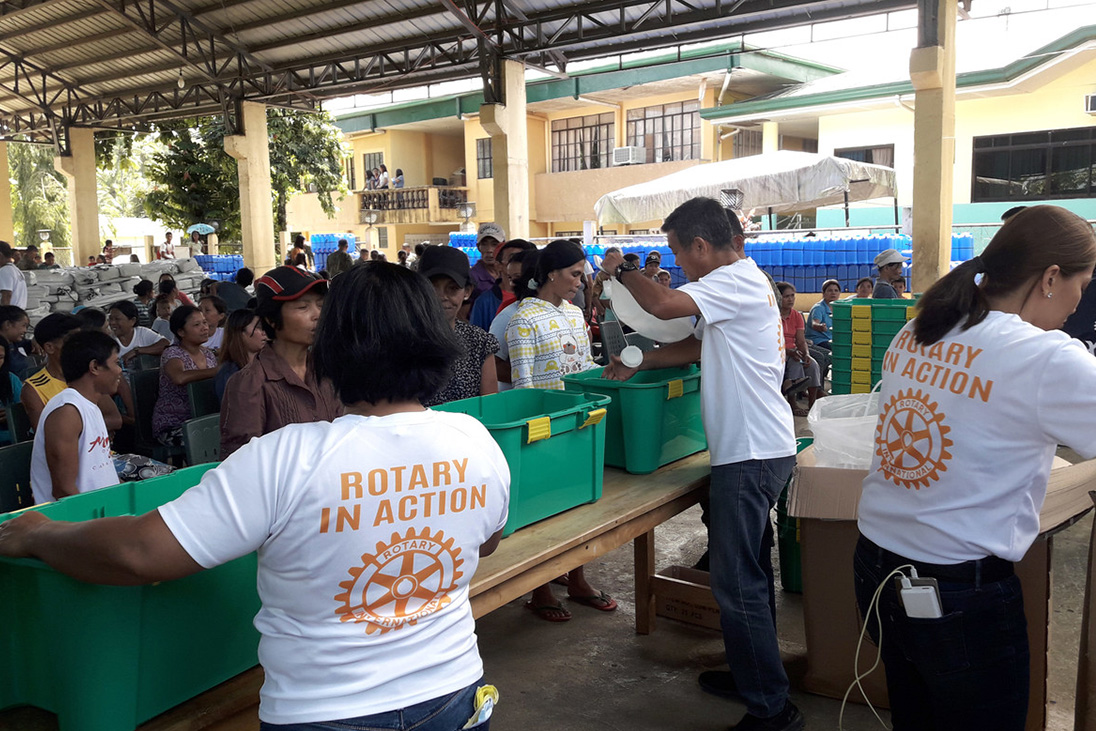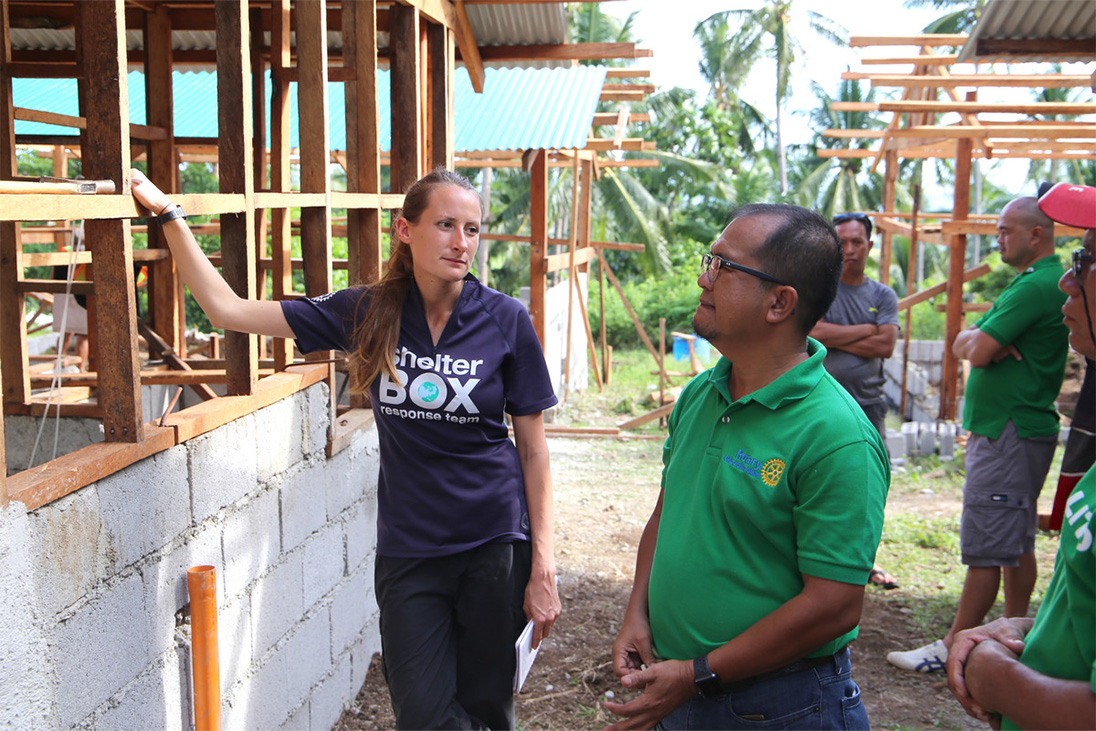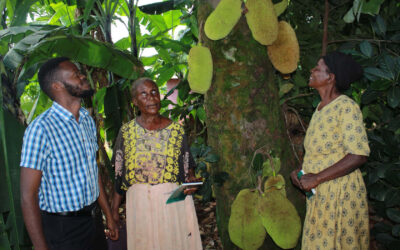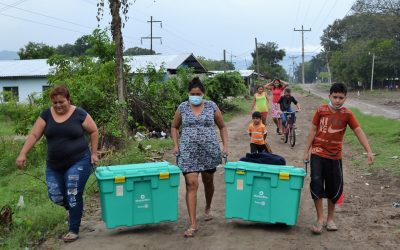Rotary International and the disaster relief charity, ShelterBox, have announced a three-year partnership renewal that will help the charity support more people, in more places, in more ways.
ShelterBox was first adopted as a millennium project by the Rotary Club of Helston-Lizard, forming a special humanitarian alliance that since 2000 has helped make a tangible difference in the lives of people around the world, raise awareness and funds. Based in Cornwall, ShelterBox provides emergency shelter and other essential items to people who have lost their homes to conflict and disaster.
With growing collaboration with Rotary members and clubs across the globe, ShelterBox became Rotary’s official project partner in disaster relief in 2012. This has helped transform it into an internationally recognised disaster relief charity, together supporting more families when they need it most.


Greater Calbayog and Catarman Rotary working together in supporting ShelterBox in Lope de Vega, Philipines after storm Usman in 2019
The official partnership has been renewed for another three years. The agreement was announced at the annual Rotary International Convention, this year hosted in the USA, where ShelterBox chief executive Sanj Srikanthan has given a keynote speech to more than 10,000 Rotary members.
Sanj Srikanthan, Chief Executive at ShelterBox, said: “Rotary has been beside us on our journey from day one and we are reminded of the significance of the partnership each time we mobilise.
“What began as a local connection with one Cornish Rotary Club has led to an extraordinary international movement that has provided emergency shelter to millions of people around the world.
Rotary has been beside us on our journey from day one and we are reminded of the significance of the partnership each time we mobilise.”
“Rotary members are involved in ShelterBox as volunteers, staff or response team members. Our responses can stretch us logistically and often it’s the Rotary network that helps us navigate the import challenges that delay our lifesaving aid or provide us with warehousing space while we wait to distribute shelter kits.
“Rotary members also help ShelterBox response teams make vital community contacts and reach disaster-affected families in remote areas who might otherwise go without.”
Most recently, in addition to their own significant response to the Ukraine crisis, Rotary members have been supporting ShelterBox’s relief effort. Using their networks in Poland, Moldova and Ukraine, Rotary members have been providing invaluable situational awareness and connections enabling ShelterBox to provide aid to those in need.
The charity is providing mattresses to people in collective centres; tarpaulins, rope, tools, and other essentials to help people living in damaged buildings; in addition to supporting women and children fleeing into Moldova.
The Rotary partnership often gives ShelterBox the flexibility and scale to respond in fast-changing emergencies, including in the Philippines after Typhoon Rai made landfall in December 2021.
The Philippines is ravaged so often by tropical storms that ShelterBox has adapted the way it works – pre-positioning aid in the country with a team on the ground ready to go when the next disaster strikes. With the help of the Rotary Club of Cebu, ShelterBox provided emergency shelter aid to 100,000 people in the aftermath of the super typhoon.
Rotary and ShelterBox will continue to collaborate, better-supporting communities in need by improving preparedness, and prepositioning aid in areas prone to disaster.”
ShelterBox has a global network of 14 affiliates, who raise funds and awareness worldwide, that evolved from Rotary relationships.
Rotary International General Secretary and CEO John Hewko said: “Rotary is a global network whose members make a lasting difference in their communities – and worldwide. We are people of action, which is why our disaster relief partnership extends far beyond financial support.
“Rotary clubs worldwide offer valuable, practical assistance to help ShelterBox reach more families fleeing disaster or conflict.


RI General Secretary John Hewko and ShelterBox CEO Sanj Srikanthan sign a project partnership extension during the Rotary International Convention. 06 June 2022, Houston, Texas, USA.
“In Haiti last year, the Rotary Club of Les Cayes provided situational updates and helped ShelterBox understand local context so they could start work sooner.
“In Honduras, the Rotary Club of San Pedro Sula, helped to find the communities where ShelterBox could make the biggest difference following Hurricanes Iota and Eta. They unloaded shipping containers, travelled to remote communities to distribute aid, and delivered shelter training.
“Rotary and ShelterBox will continue to collaborate, better-supporting communities in need by improving preparedness, and prepositioning aid in areas prone to disaster.”
What began as a local connection with one Cornish Rotary Club has led to an extraordinary international movement that has provided emergency shelter to millions of people around the world.”
The renewal of the partnership comes at a decisive time against the backdrop of Covid and the impact it’s had on communities worldwide. It’s a crisis that will be dwarfed by the impact of a changing climate in the years ahead, with ShelterBox research highlighting how 167 million homes could be lost to climate change in the next 20 years.
Flooding will be a leading cause of the weather-related disaster, warming oceans will bring heavier rain to places that can’t cope with it, and other parts of the world will face ever more deadly droughts like the one East Africa is currently confronting.


Rotary working with ShelterBox in the Philippines during Typhoon Kaitak in 2018.
To better meet the needs of the people who need support, ShelterBox is continuously evolving to find durable solutions. It no longer provides aid only in boxes, instead of providing combinations of aid, packaged in a variety of ways to make a tangible difference.
A tarpaulin is a difference between a family staying dry in their makeshift home or not. Solar lights help families spend time together when the electricity supply is impacted. A mosquito net helps families worry less about their children’s health in areas known to have malaria or dengue fever. Cash empowers local communities to hire skilled labour or buy the materials they need to rebuild their houses.
ShelterBox currently has teams working to support communities in Ukraine, Yemen, Burkina Faso, Mozambique, the Philippines, Syria, Cameroon, Ethiopia, Haiti, and Nigeria.
Click here to find out more about ShelterBox.










